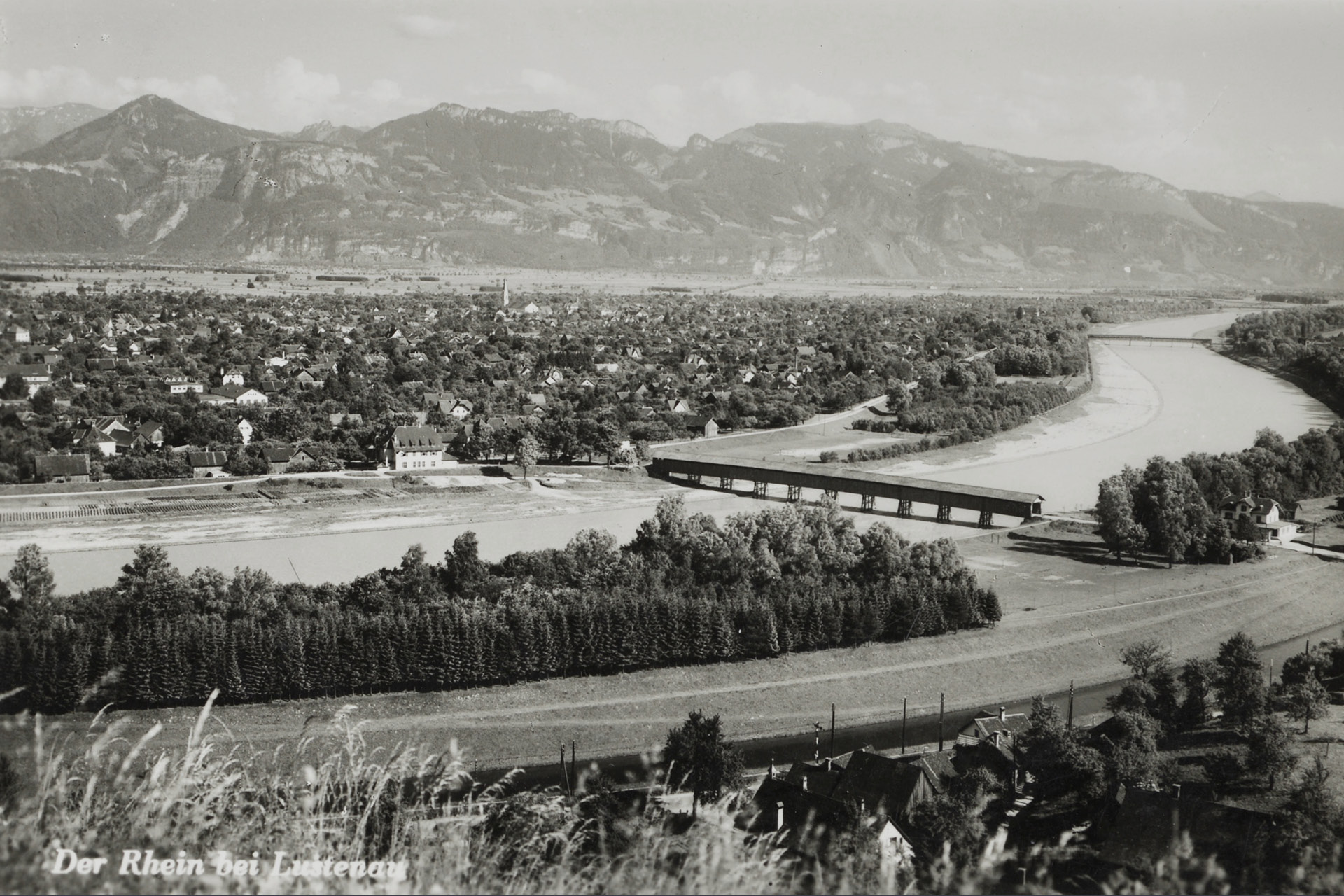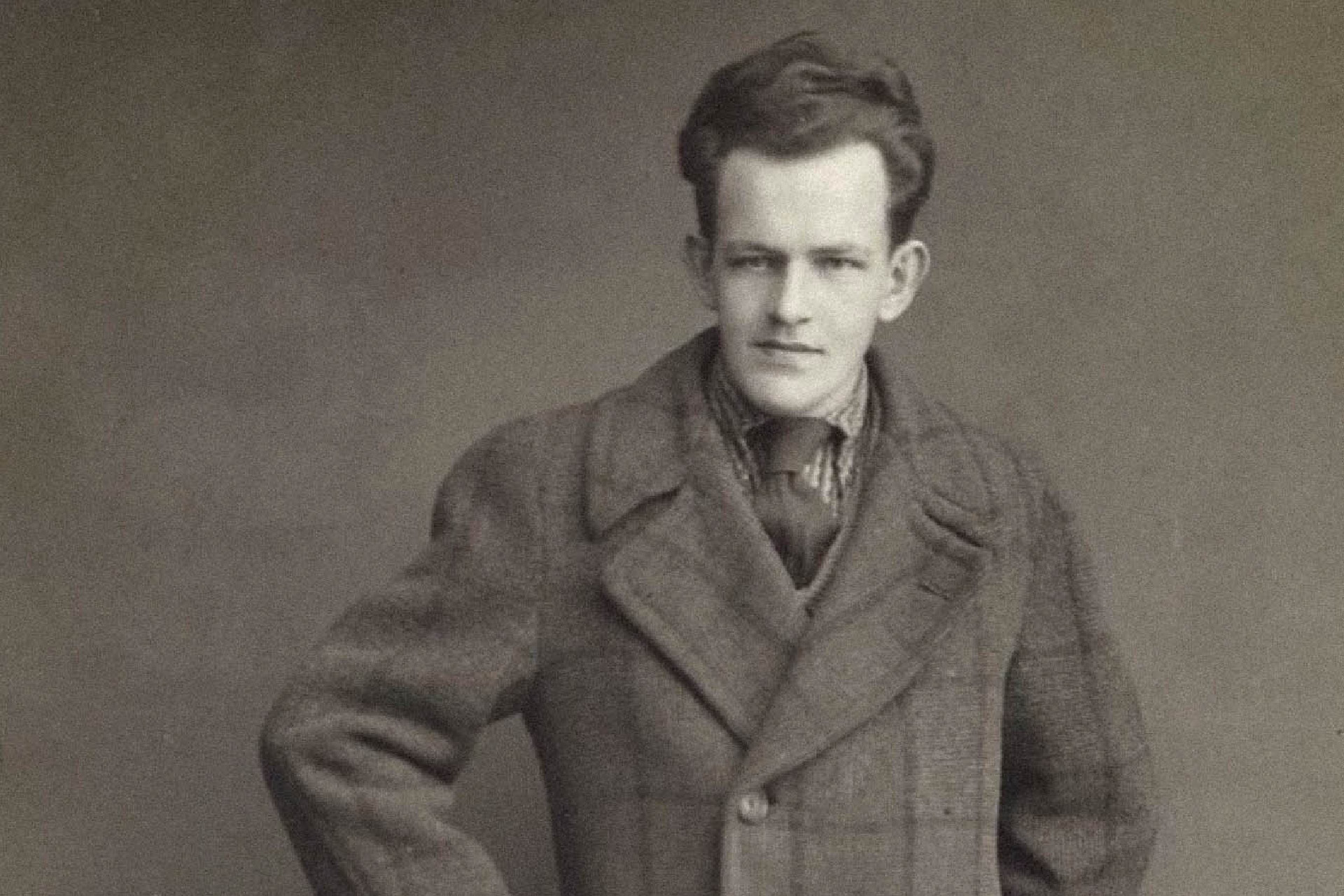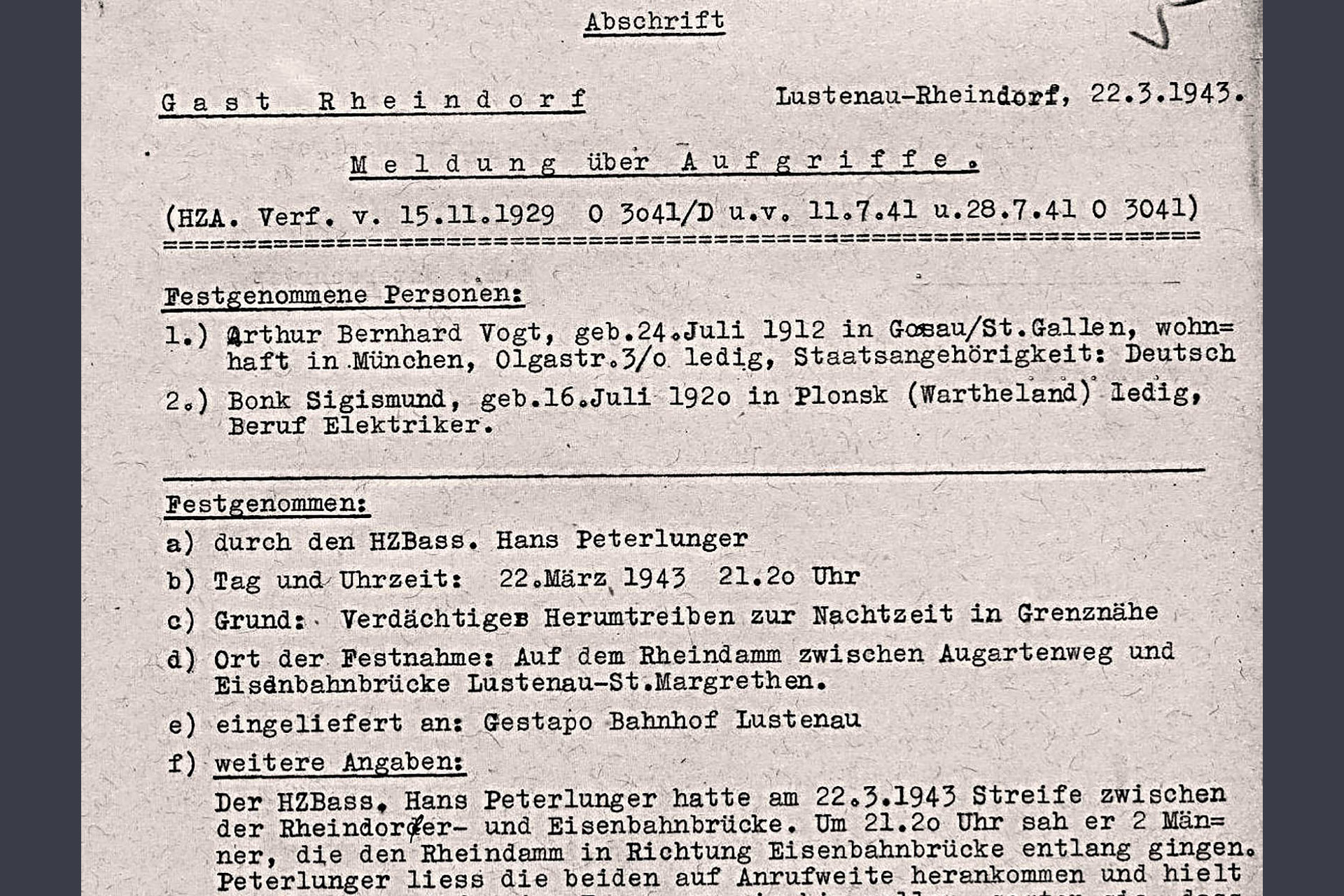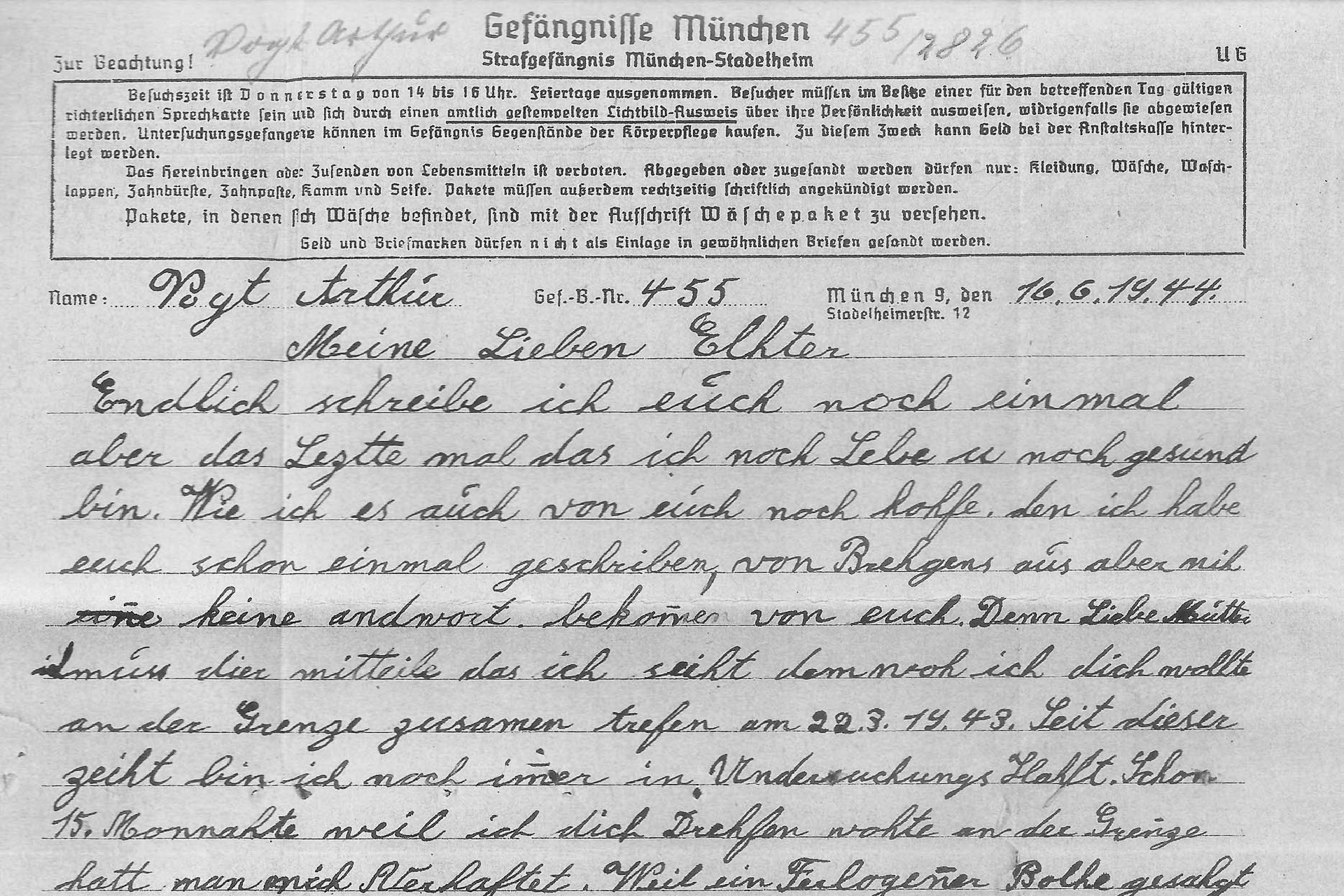Arthur Vogt and Zygmunt Bąk> March 22, 1943
13 Arthur Vogt and Zygmunt Bąk
Instead of going home they are heading to their doom: Arthur Vogt and Zygmunt Bak fail on the way to Höchst
Lustenau, March 22, 1943
“(c) Reason: Suspicious loitering at night time near the border
d) place of arrest: on the Rhine embankment between Augartenweg and the Lustenau - St. Margrethen railroad bridge
e) handed in to: Gestapo station Lustenau”[1]
Two men are arrested in Lustenau on the Rhine. One of them is Arthur Vogt, born in 1912 in Gossau in the Canton of St. Gall, but a subject of the Austrian-Hungarian Monarchy. Later he becomes a citizen of Czechoslovakia, then German. The other, Zygmunt Bak, born in Plonsk in 1920, is Polish.
”(f) Other information:
Auxiliary customs operations assistant Hans Peterlunger was on patrol between the Rheindorfer Bridge and the railroad bridge on March 22, 1943. At 9:20 p.m. he saw 2 men walking along the Rheindamm in the direction of the railroad bridge. Peterlunger let the two approach within calling distance and then stopped them. When he asked where they were going, they said they were going to Höchst. Peterlunger noticed that one of the two could only speak broken German, so he arrested them temporarily and took them to the Rheindorf border control post. The two were physically searched at the border control post. They were not carrying anything suspicious except for items of daily use and means of payment indicated on the notice of arrest and seizure.”
Arthur Vogt states that he had been living in Munich for four years, but that his parents lived in St. Gall. He had wanted to meet his mother at the Höchst customs office and that he had met Bak in Lustenau. Bak stated that he had left Plonsk to visit his brother in Höchst, who would be working for a farmer there - and then wanted to report for work at the Organization Todt.
The Gestapo subjects the two to rigorous interrogation in Bregenz, separately, and they entangle themselves in contradictions. Vogt now admits that he had met Bak eight days earlier in Munich at the “Tannenbaum” restaurant, where foreign workers were allowed to eat. Bak admits that he wanted to try to get into Switzerland. And now incriminates Vogt with the statement that the latter had wanted to take him there.
Arthur Vogt has several criminal records in Switzerland – as a homosexual, at that time still a prosecuted offense, and he was expelled from the Swiss territory. Further punishments followed, because he did not obey the expulsion. His parents after all live in Switzerland. In the German Reich he is sentenced several times for begging, petty theft and illegal residence. His work book documents numerous short-lived occupations as an unskilled laborer and furniture carrier from 1939 on.
The case is handed over to the senior public prosecutor's office in Feldkirch. The two are accused of violating the passport penal ordinance and a minor foreign exchange offense. But the case is dragging on.
In January 1944 Arthur Vogt is still in custody, now in Feldkirch. He writes to the public prosecutor's office and asks for probation on the front. But instead of being sent to the front, he is transferred to the Munich-Stadelheim prison. In the summer of 1944 all courage has left him. He writes to his parents in St. Gall.
“Name: Vogt Arthur, prisoner no. 455 Munich, June 16, 1944
My Dear Parents
At last I am writing to you once again - but [it is] the last time that I am still alive and healthy. As I still hope for you too. Because I have already written to you once, from Bregenz, but never received an answer from you. Dear Mother, I must tell you that since I wanted to meet you at the border on March 22, 1943. Since that time I am still in custody. I was arrested for 15 months because I wanted to meet you at the border. Because a crooked Pole is supposed to have said that I wanted to lead him to Switzerland, because he was with me when they arrested me at the border.
So that he could go to the Polish Legion and I would help him with it, they said that I wanted to help him [to go] to the Legion. I don't know anything about all this. But they claimed that I did know, and [now] I am accused of favoring the enemy and high treason at the People's Court. On June 27, 44 I have my trial, first I was in Bregenz for 3 1/2 months, then in Feldkirch for 8 1/2 months and in Munich Stadelheim for 3 months. Therefore I ask you, dear Mother, to be so good as to send me a little fruit and bread and hard chestnuts. But do not forget me and send them to me while I am still alive.
Farewell dear mother and many greetings to you all from Arthur.”[2]
The delivery of the letter is not approved. Arthur Vogt's last message to his parents goes into the files instead. On June 27, Arthur Vogt and Zygmunt Bak are sentenced to death by the People's Court for aiding the enemy. According to the verdict, they had ”gone to the Reich border in the fourth year of the war in order to escape to Switzerland and deprive the Reich of their workforce.”
In July, Arthur makes a last desperate attempt to save himself, asking once again to be allowed to enlist in the Waffen SS for front-line duty. “For Führer and Germany I want to prove it, that I am a German until death.”
On August 17, the Reich Minister of Justice sends the written decree of the death sentence to the Chief Public Prosecutor and asks him to “arrange for the further steps to be taken with the utmost speed.” A short time later, the Munich Chief Public Prosecutor informs the Chief Reich Prosecutor at the People's Court by telegraph: “Matter will be settled September 12, 5 pm.”
On this day, the two are executed in the Munich-Stadelheim prison. The protocol notes:
“The execution process lasted 2 minutes 20 seconds from the time of leaving the cell, and 10 and 12 seconds respectively from the time of handing over to the executioner until the axe fell. No incidents or other occurrences of significance are to be reported.”[3]
On September 30, 1944, Lina Vogt, Arthur's mother in St. Gall, does not yet know anything about the end of her son. She writes to the Chief Reich Prosecutor at the People's Court in Berlin, with the most heartfelt request to tell her how she can help her son. “As a mother, I do not want to omit anything in order to save my dear son! Since I know that there is a very good soul in him!”
A little later, the family receives the estate of Arthur Vogt:
“1 coat, 1 hat, 1 skirt, 2 pairs of pants, 1 vest, 2 shirts, 6 pairs of socks, 1 briefcase, 6 keys, 1 revolving pencil, 1 toothbrush, 1 pair of loafers, 1 pair of slippers, 1 wallet with old letters, 1 purse, 2 brushes, 1 razor, 1 spoon, 1 knife, 1 pair of scissors, 1 binder.”[4]
[1] Report of the Rheindorf border control office to District Customs Commissioner G, Dornbirn, 22 March 1943. The documentation of the story of Arthur Vogt and Zygmunt Bak owes much to the accurate research of Niko Hofinger, Innsbruck.
[2] Censored (unpromoted) farewell letter from Arthur Vogt to his parents, 16.4.1944, Collection R 3018 (National Socialist Justice), Federal Archives Berlin.
[3] The Chief Public Prosecutor Munich I. to Reich Minister of Justice, 16.9.1944, Collection R 3018 (National Socialist Justice), Federal Archives Berlin.
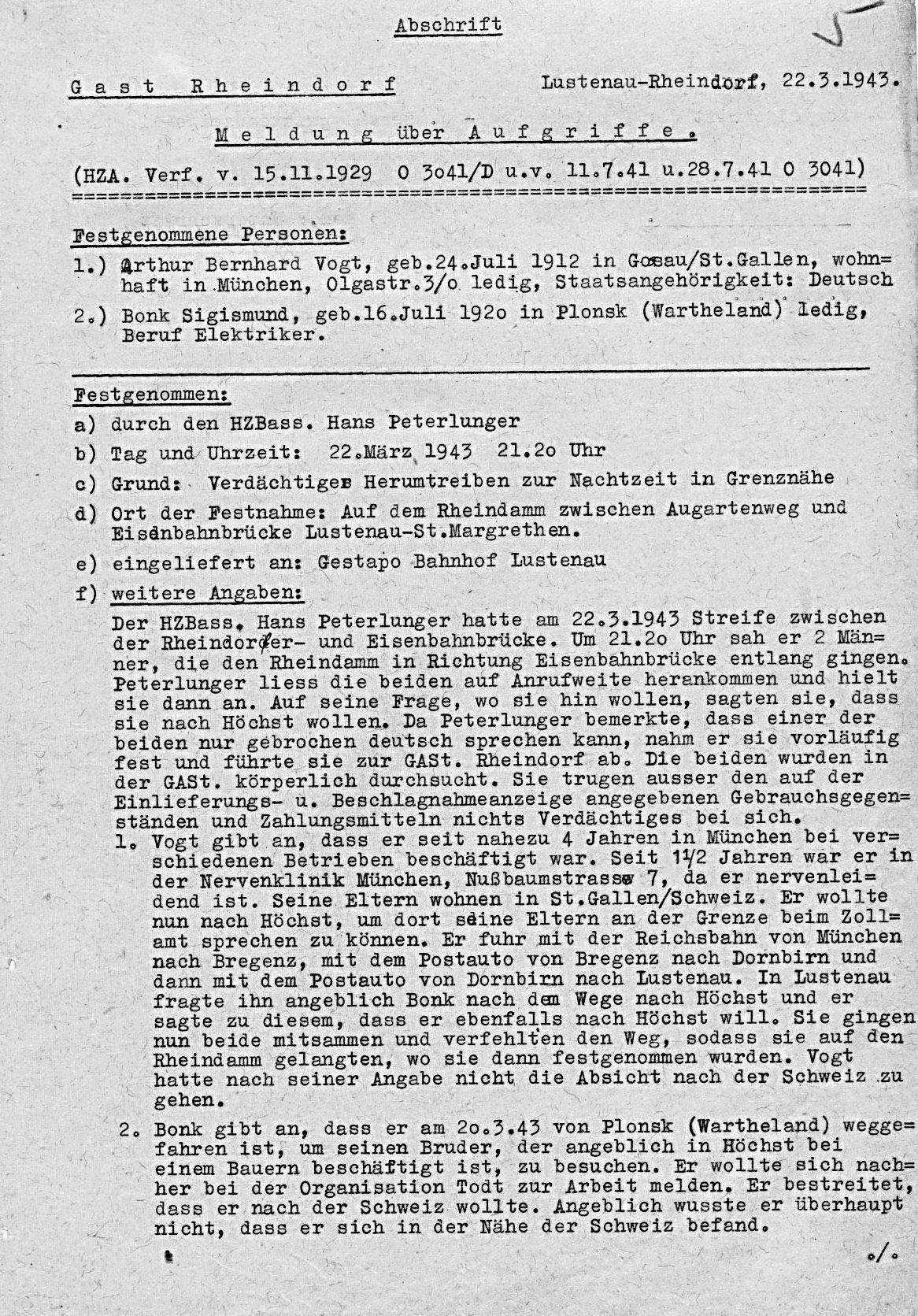
Report of the arrest of Arthur Vogt and Zygmunt Bak in Lustenau, March 22, 1943
BArch_R 3018/3640, Bundesarchiv
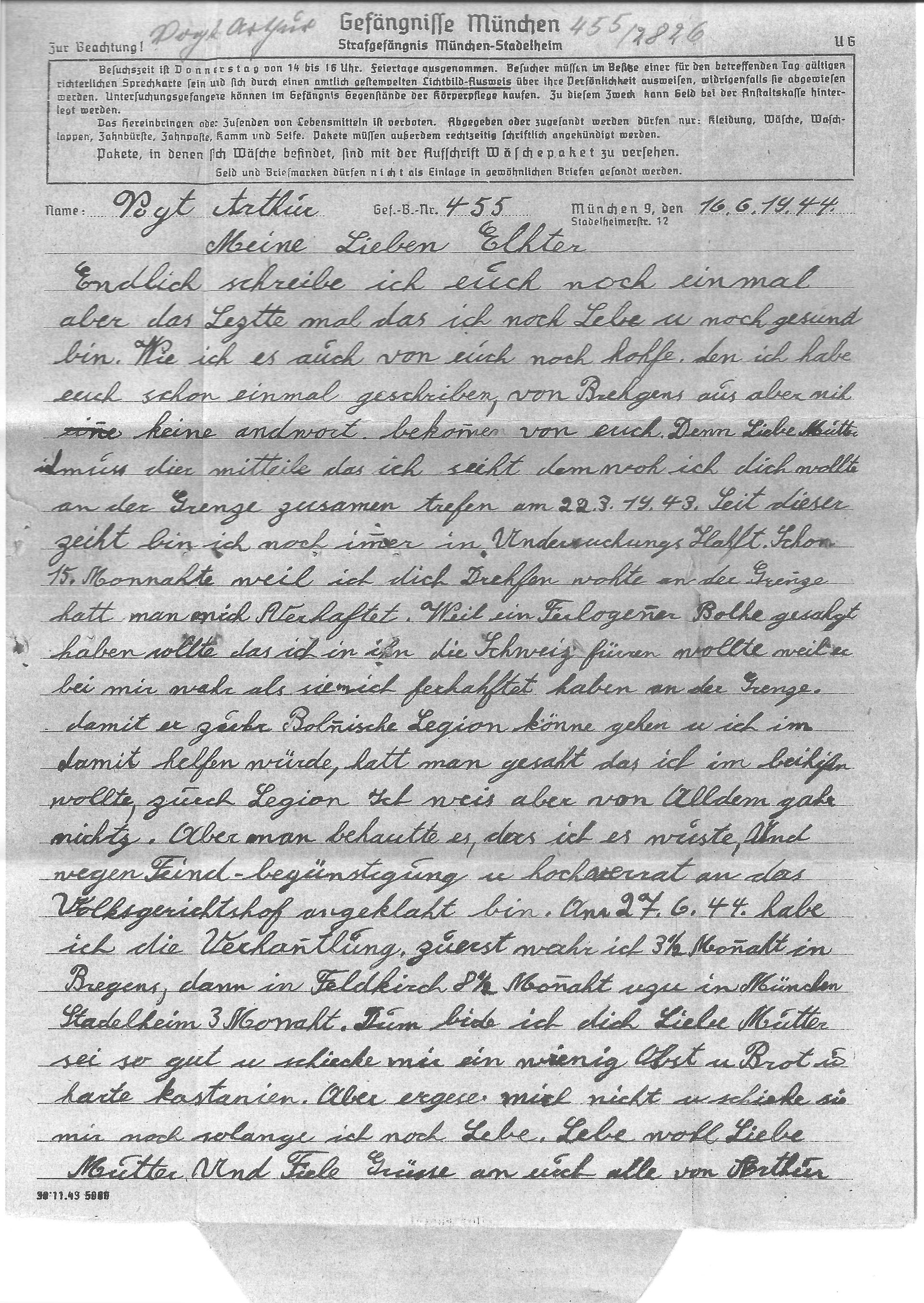
Farewell letter from Arthur Vogt to his mother, June 16, 1944
BArch R 3018/3640, Bundesarchiv
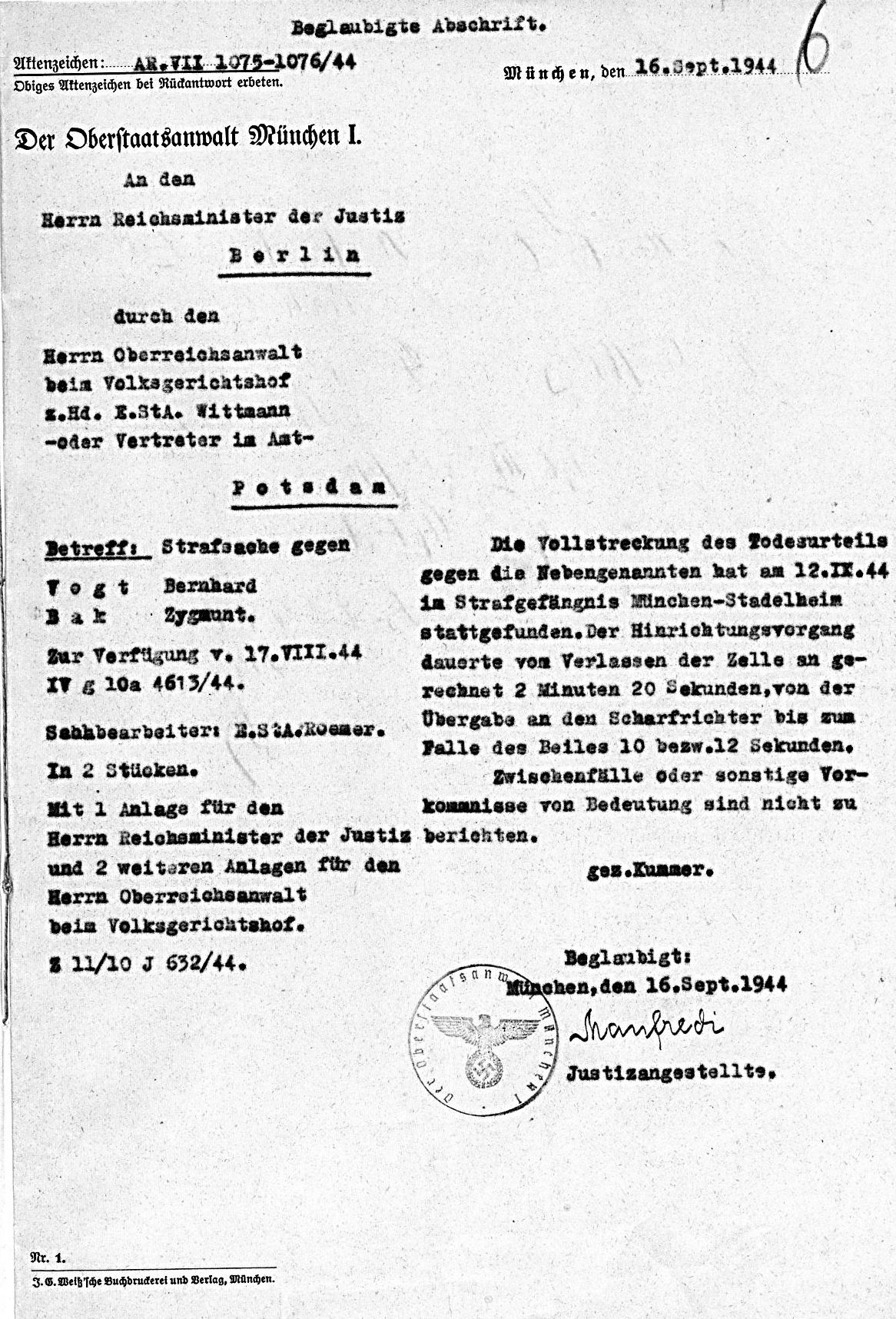
Notification of the execution of the sentence to Arthur Vogt, September 16, 1944
BArch R 3018/3562, Bundesarchiv
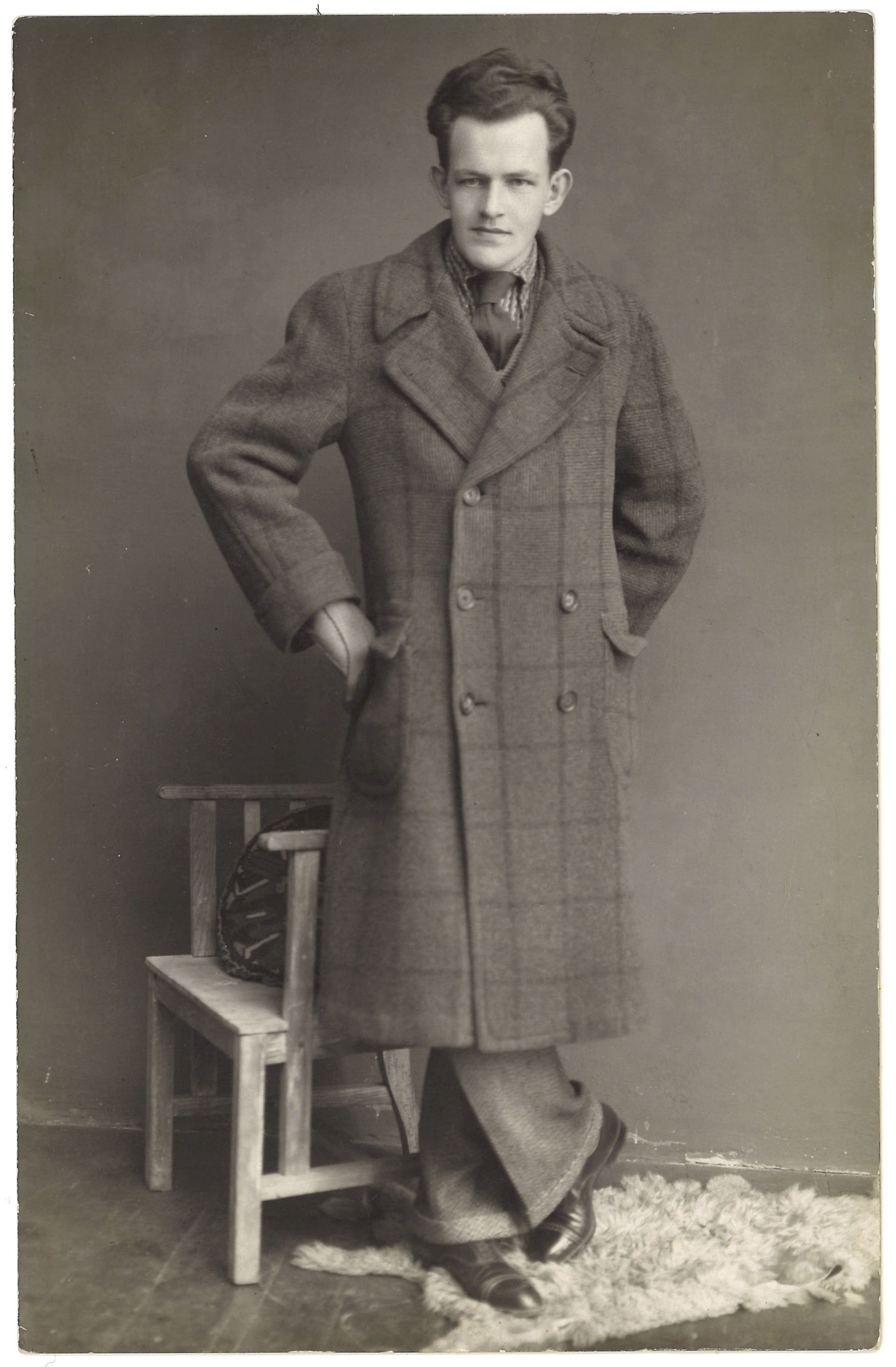
Arthur Vogt, about 1940
Family Archiv Fuchs
13 Arthur Vogt and Zygmunt Bąk
Instead of going home they are heading to their doom: Arthur Vogt and Zygmunt Bak fail on the way to Höchst
Lustenau, March 22, 1943
“(c) Reason: Suspicious loitering at night time near the border
d) place of arrest: on the Rhine embankment between Augartenweg and the Lustenau - St. Margrethen railroad bridge
e) handed in to: Gestapo station Lustenau”[1]
Two men are arrested in Lustenau on the Rhine. One of them is Arthur Vogt, born in 1912 in Gossau in the Canton of St. Gall, but a subject of the Austrian-Hungarian Monarchy. Later he becomes a citizen of Czechoslovakia, then German. The other, Zygmunt Bak, born in Plonsk in 1920, is Polish.
”(f) Other information:
Auxiliary customs operations assistant Hans Peterlunger was on patrol between the Rheindorfer Bridge and the railroad bridge on March 22, 1943. At 9:20 p.m. he saw 2 men walking along the Rheindamm in the direction of the railroad bridge. Peterlunger let the two approach within calling distance and then stopped them. When he asked where they were going, they said they were going to Höchst. Peterlunger noticed that one of the two could only speak broken German, so he arrested them temporarily and took them to the Rheindorf border control post. The two were physically searched at the border control post. They were not carrying anything suspicious except for items of daily use and means of payment indicated on the notice of arrest and seizure.”
Arthur Vogt states that he had been living in Munich for four years, but that his parents lived in St. Gall. He had wanted to meet his mother at the Höchst customs office and that he had met Bak in Lustenau. Bak stated that he had left Plonsk to visit his brother in Höchst, who would be working for a farmer there - and then wanted to report for work at the Organization Todt.
The Gestapo subjects the two to rigorous interrogation in Bregenz, separately, and they entangle themselves in contradictions. Vogt now admits that he had met Bak eight days earlier in Munich at the “Tannenbaum” restaurant, where foreign workers were allowed to eat. Bak admits that he wanted to try to get into Switzerland. And now incriminates Vogt with the statement that the latter had wanted to take him there.
Arthur Vogt has several criminal records in Switzerland – as a homosexual, at that time still a prosecuted offense, and he was expelled from the Swiss territory. Further punishments followed, because he did not obey the expulsion. His parents after all live in Switzerland. In the German Reich he is sentenced several times for begging, petty theft and illegal residence. His work book documents numerous short-lived occupations as an unskilled laborer and furniture carrier from 1939 on.
The case is handed over to the senior public prosecutor's office in Feldkirch. The two are accused of violating the passport penal ordinance and a minor foreign exchange offense. But the case is dragging on.
In January 1944 Arthur Vogt is still in custody, now in Feldkirch. He writes to the public prosecutor's office and asks for probation on the front. But instead of being sent to the front, he is transferred to the Munich-Stadelheim prison. In the summer of 1944 all courage has left him. He writes to his parents in St. Gall.
“Name: Vogt Arthur, prisoner no. 455 Munich, June 16, 1944
My Dear Parents
At last I am writing to you once again - but [it is] the last time that I am still alive and healthy. As I still hope for you too. Because I have already written to you once, from Bregenz, but never received an answer from you. Dear Mother, I must tell you that since I wanted to meet you at the border on March 22, 1943. Since that time I am still in custody. I was arrested for 15 months because I wanted to meet you at the border. Because a crooked Pole is supposed to have said that I wanted to lead him to Switzerland, because he was with me when they arrested me at the border.
So that he could go to the Polish Legion and I would help him with it, they said that I wanted to help him [to go] to the Legion. I don't know anything about all this. But they claimed that I did know, and [now] I am accused of favoring the enemy and high treason at the People's Court. On June 27, 44 I have my trial, first I was in Bregenz for 3 1/2 months, then in Feldkirch for 8 1/2 months and in Munich Stadelheim for 3 months. Therefore I ask you, dear Mother, to be so good as to send me a little fruit and bread and hard chestnuts. But do not forget me and send them to me while I am still alive.
Farewell dear mother and many greetings to you all from Arthur.”[2]
The delivery of the letter is not approved. Arthur Vogt's last message to his parents goes into the files instead. On June 27, Arthur Vogt and Zygmunt Bak are sentenced to death by the People's Court for aiding the enemy. According to the verdict, they had ”gone to the Reich border in the fourth year of the war in order to escape to Switzerland and deprive the Reich of their workforce.”
In July, Arthur makes a last desperate attempt to save himself, asking once again to be allowed to enlist in the Waffen SS for front-line duty. “For Führer and Germany I want to prove it, that I am a German until death.”
On August 17, the Reich Minister of Justice sends the written decree of the death sentence to the Chief Public Prosecutor and asks him to “arrange for the further steps to be taken with the utmost speed.” A short time later, the Munich Chief Public Prosecutor informs the Chief Reich Prosecutor at the People's Court by telegraph: “Matter will be settled September 12, 5 pm.”
On this day, the two are executed in the Munich-Stadelheim prison. The protocol notes:
“The execution process lasted 2 minutes 20 seconds from the time of leaving the cell, and 10 and 12 seconds respectively from the time of handing over to the executioner until the axe fell. No incidents or other occurrences of significance are to be reported.”[3]
On September 30, 1944, Lina Vogt, Arthur's mother in St. Gall, does not yet know anything about the end of her son. She writes to the Chief Reich Prosecutor at the People's Court in Berlin, with the most heartfelt request to tell her how she can help her son. “As a mother, I do not want to omit anything in order to save my dear son! Since I know that there is a very good soul in him!”
A little later, the family receives the estate of Arthur Vogt:
“1 coat, 1 hat, 1 skirt, 2 pairs of pants, 1 vest, 2 shirts, 6 pairs of socks, 1 briefcase, 6 keys, 1 revolving pencil, 1 toothbrush, 1 pair of loafers, 1 pair of slippers, 1 wallet with old letters, 1 purse, 2 brushes, 1 razor, 1 spoon, 1 knife, 1 pair of scissors, 1 binder.”[4]
[1] Report of the Rheindorf border control office to District Customs Commissioner G, Dornbirn, 22 March 1943. The documentation of the story of Arthur Vogt and Zygmunt Bak owes much to the accurate research of Niko Hofinger, Innsbruck.
[2] Censored (unpromoted) farewell letter from Arthur Vogt to his parents, 16.4.1944, Collection R 3018 (National Socialist Justice), Federal Archives Berlin.
[3] The Chief Public Prosecutor Munich I. to Reich Minister of Justice, 16.9.1944, Collection R 3018 (National Socialist Justice), Federal Archives Berlin.

Report of the arrest of Arthur Vogt and Zygmunt Bak in Lustenau, March 22, 1943
BArch_R 3018/3640, Bundesarchiv

Farewell letter from Arthur Vogt to his mother, June 16, 1944
BArch R 3018/3640, Bundesarchiv

Notification of the execution of the sentence to Arthur Vogt, September 16, 1944
BArch R 3018/3562, Bundesarchiv



